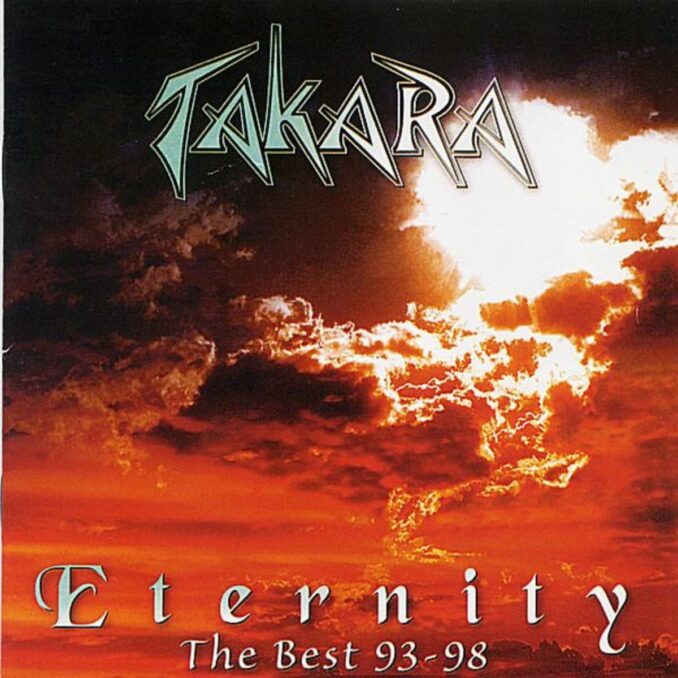
Summary
Lion Music
Release date: 2004
User Review
( votes)Takara has one of the strangest histories of any band around. To start with, on their compilation Eternity: The Best of 93-98, band leader/guitarist Neal Grusky says about lead singer Jeff Scott Soto, “For the record, Jeff was never an official member of Takara.” So it seems odd that they could release a “best of” that features a guy who was never an official member of the band and yet covers five years. Their newest incarnation of Takara has Michael James on board as the new singer, and they have released Perception of Reality without Soto. Anyway, Eternity … IS about the Soto years, and they are well worth a listen …
Because they formed in 1987, they have that “look” about them: long, teased hair; unbuttoned shirts; necklaces; etc. But they are not really a hair metal band. They have a sophistication and level of maturity that belies whatever look they were going for. It’s melodic rock with insightful lyrics sung mostly about love, and not about getting their rocks off. Part of this maturity does flow from Soto’s distinct emotional style, though.
Anyway, getting to the music, Takara hits us with “Spotlight,” one of their hardest songs on the compilation. You’ll hear Grusky playing a mean intro, Bon Jovi-type keyboards, and Soto’s characteristically adept voice. This is pure rock song, no frills, just straight-ahead rock and roll. As is there norm, they don’t just make up lyrics to rhyme, but actually tell a story. Think of “Jukebox Hero” here. If you’ve never heard them before, they picked the perfect song to start things off. You’ll enjoy a wicked guitar solo here as well.
“Two Hearts Together” begins a cappella and again, you’ll just have to dig Soto’s voice. You really can’t say enough about what an incredible singer he is. (In some ways, it’s too bad he never dove into Takara full time, once you hear what they can do.) This is a more pared down rock song, and Grusky proves he can rip it up if need be.
By the third song, they start getting into their normal type of song, meaning slower, even more melodic, and just radio-friendly hard rock. “Restless Heart” sounds a bit like Heaven’s Edge “Cry,” a triumphant almost-ballad, with more rock and soul than your usually brooding ballad. The acoustic guitar is sharp as well.
Takara added keyboardist Eric Ragno later on, but during the song “Colors Fade,” it seems Soto is doing keyboard duties as well as vocals. This is another ballad, the kind of song that truly embodies the Takara sound, whether they like it or not.
By the time you make it down to “Last Mistake,” the formula starts getting to you. The songs begin slow, often with acoustic guitar and understated keys, and the song crescendos to the chorus. While variety isn’t one of their strongest suits, on this one they do a little stealing of “Because the Night” with Soto’s vocals matching the “they can‘t hurt you now-ooo-ow-ooo-ow-ooo-ow” that Springsteen wrote so well.
The best part about this CD is the quality of material and the clarity of sound. The production is dead-on, and their musicianship is just crystal clear. On songs like “Say You’ll Stay” and “Don’t Wanna Be Alone,” you’ll appreciate their efforts.
Takara ends the CD with acoustic covers of “Restless Heart” and “Your Love.” The full band version of “Restless Heart” is better, but not by much. The transition from electric to acoustic is obviously as simple as breathing for this band. “Your Love” is more upbeat, so the acoustic version works just as well as the original. Plus, Soto’s vocals aren’t obscured by any drums or bass, and anytime you can hear his voice better, it’s a treat.
It will be interesting to see how Takara does without Soto’s magic touch. This is Takara saying goodbye to the past while embracing their future, and if the view through their windshield looks anything like the view in their rear-view mirror, Takara has a lot more gas in their tank.
Car analogies rule.




Be the first to comment